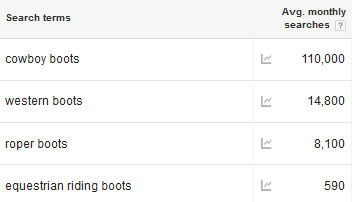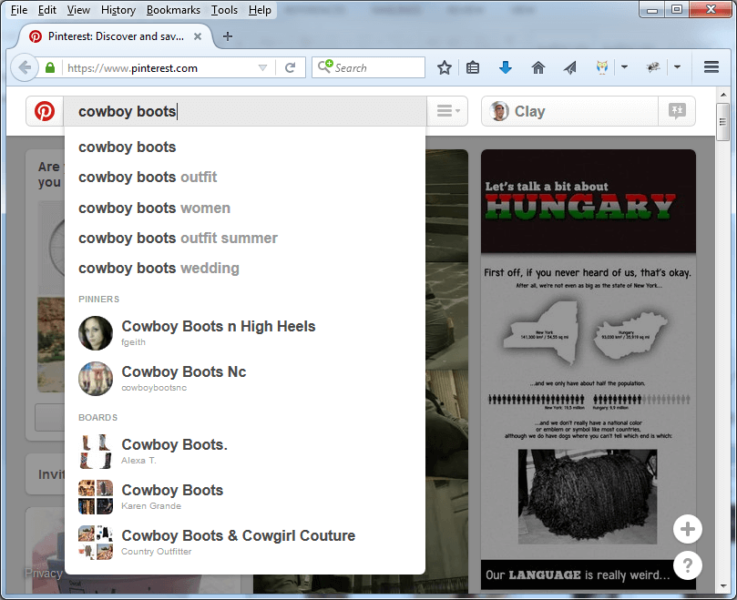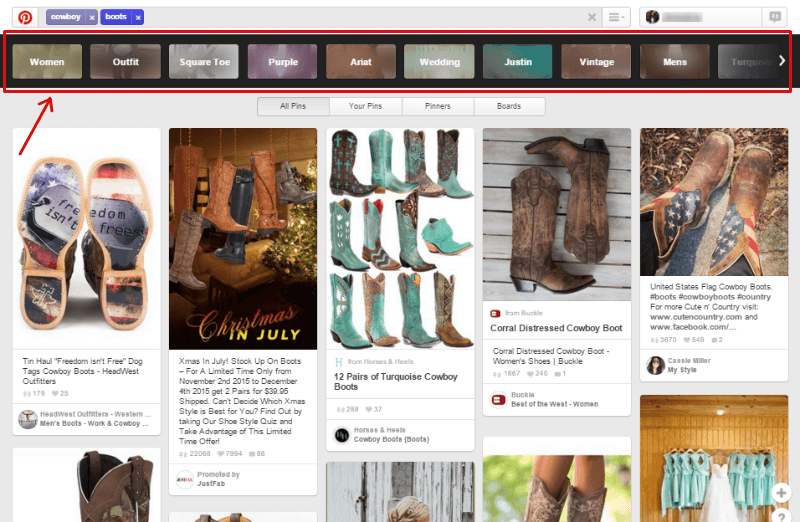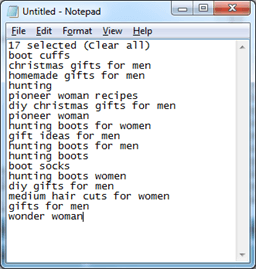Using Pinterest For Keyword Research
Google's Keyword Planner may go deep, but does it go wide enough to fulfill modern SEO's need for semantically relevant phrases? Columnist Clay Cazier explores one alternative data source: Pinterest.
One of the foundations of good SEO is making sure your site content is relevant to what you offer and that this content is optimized to use the same language commonly used by consumers.
For example, most outfitters would be advised to develop content and optimize around their stock of cowboy boots rather than referring to their items as western boots or roper boots.
The table above, pulled from the Google AdWords Keyword Planner, gives us the cold, statistical justification behind this decision — we want to talk about our cowboy boots because 10x more people think of what we offer in those terms.
But as Google’s organic ranking formula has become more complex, the limitations of Keyword Planner are beginning to show.
Why Pinterest?
SEO’s job isn’t to focus all clients on the biggest average monthly search number. Furthermore, SEO is no longer a math game where we rely on density ratios to target that handful of short-tail keywords.
We’re now challenged to present the long-tail keywords relating to our goods and services. And lately, we are learning more and more about how the use of semantically related phrases is one way “good” content is recognized and rewarded with rankings.
In the modern SEO world, phrases like roper boots become more important not necessarily because of their monthly search volume, but because of the semantic relationship between ropers and cowboy boots and the (likely) higher conversion rate that could be delivered by such a niche term.
Keyword Planner is good for paid search campaigns targeting transactional keywords, and it’s even fairly good at exposing long-tail keyword variants, but it is woefully inadequate at exposing the semantics surrounding those transactional phrases.
Where can we turn for a deeper semantic understanding of these (still transactional) phrases? There have been countless articles suggesting tactics ranging from Google Instant, Google Related Searches and keyword mining using hashtags found in the social world.
While those are absolutely valid, worthwhile methods, it struck me that Pinterest would be a particularly useful place for retailers to mine keywords because:
- According to Internet Retailer, Pinterest users’ average order value is $123.50, which is about 126 percent more than Facebook users’ $54.64 average order value.
- Pinterest is a particularly visual medium, which aligns well with the increasing dominance of mobile in consumers’ search process.
- Pinterest has much more of a sales/retail focus than Facebook, Instagram or Twitter, making the information found there more likely to coincide with what purchasers are looking for.
So let’s look at how to use Pinterest for keyword research. Our goal is twofold:
- Near term, Pinterest keyword research can help guide Pinterest board titles, Pinterest pin descriptions and/or image filenames to drive qualified referral traffic.
- From a longer term, particularly “SEO” point of view, Pinterest keyword research can guide content used in retail category descriptions, content used as blog topics, images used, image filenames and/or even retail categories or facets.
Pinterest Option 1: “Pinterest Instant”
Let’s start with the easiest method: watching the phrases that populate within Pinterest search as you type. The example below is a simple one — “cowboy boots” is the primary focus of a client, and they’d like to know popular ways people are searching for the item other than by gender and color.
Go one step further and drill down into one of those suggestions, and you’ll see that outfits by season and looks with jeans are hot topics.
This can not only direct blog, “lookbook” and social media content, but it should also direct the navigation, landing pages and e-commerce database filters configured on retailers’ sites.
Pinterest Option 2: Guided Search
I’ll admit, Pinterest Instant does not yield a ton of results unless you drill down and re-drill. But Pinterest’s focus on being mobile-friendly has led them to develop Guided Search, a row of semantically related keyword refinements in a horizontal bar across the top of their search results page. To see the results of Pinterest’s Guided Search:
- Go to pinterest.com and type in a seed keyword (example “cowboy boots”).
- You’ll get guided search results like in the screenshot below that are top “modifiers” or semantically related keywords:
- Place your cursor at the beginning of the list, click and drag to the bottom right of your screen to highlight the entire list (even though you won’t actually be able to see the rest of the list, trust me, it’s there).
- Hit [CTRL-C] to copy the entire list.
- Open Word. Paste as Text. You’ll get something like you see in the screenshot below:
- Hit [CTRL-H] to find and replace.
- Find the string Search for ‘ and replace with ^p (that’s a carriage return in Word-ese).
- Hit [CTRL-H] to find and replace the single quote ‘ with ^t^t (that’s two tabs in Word-ese). You’ll then have a tab-delimited list like you see in the screenshot below.
- You can then hit [CTRL-A] to highlight all and either copy and paste into Excel or use Word’s Insert/Table/Convert Text to a Table function to turn the info into a table.
Column 1 is the semantically related phrase. Column 2 gives us a little white space, and Column 3 is the keyword itself.
- You can now use this list to populate topics in your content calendar, to help determine new facets/filters in your e-commerce catalog or to show management the products consumers want that you have.
“Aha!” you might say. “Those keywords look just like what Keyword Planner gives me.” But the fine difference between the two systems makes all the difference in the world. Yes, Pinterest Guided Search does serve up variants based on gender, color and brand (just like Keyword Planner), but the addition of style and situation — the semantics — is what is special.
Phrases like “cowboy boots wedding,” “cowboy boots with shorts,” “how to wear cowboy boots,” and even “cowboy boots photography” give us a glimpse not just of how people search for the product, but how it fits into wearers’ lives.
Remember, good SEO is about users first, search engines second — and this nuance of Pinterest-based keyword research highlights product use cases, not just keyword modifiers.
Pinterest Option 3: Promoted Pin Suggestions
The final way to use Pinterest for keyword research is to leverage their Promoted Pin suggestions. To do this, the only catch is you have to have a Pinterest for Business account.
- Login to the Pinterest for Business account.
- Click the account holder’s name at the top right.
- Click the “cog” image, and you’ll see Promoted Pins in the drop-down.
- A new window will open. Click the red “Promote” button at the top right.
- You’ll be prompted to enter a campaign name and budget. Enter something like “Test” and $10.00.
- Click the red “Pick a Pin” button.
- Find one of the client’s pins that represents the seed keyword and click to “Promote” it. I chose a hunting boot.
- You’ll be prompted to enter terms related to your pin. I’ve entered “hunting boots.” The terms returned are the related topics and/or categories (semantically related keywords and concepts) we’re interested in.
- Click “Add all results and related terms” to see the results and related terms in one area. Drag to highlight them all, copy and paste somewhere you can work with them. (Hint: If you copy and paste this list to Notepad, they’ll come out as a nice list.)
As you can see, this list does not delve into keyword variants as much as it explores the concepts, ideas and interests Pinterest users associate with hunting boots. There are a few odd ones (like “medium hair cuts for women” and “wonder woman”), but even if those aren’t useful parts of a strictly SEO campaign, they could be useful test elements in your team’s wider content marketing efforts. (“Wonder woman” reminds me of the time our social media team discovered the affinity a plus size fashion client’s Facebook following had for “I Love Lucy”).
For retail sites in particular, your site’s ability to gain organic traffic depends not only on ranking for long-tail variants of your product line, but also on the semantic quality of product, category and blog copy. As the difference between a good and a great organic ranking increasingly relies on these semantic connections, the shortcomings of Google’s AdWords Keyword Planner are becoming more evident.
While I am not advocating the abandonment of the Keyword Planner, it is important that SEO pros and site owners consider keyword options outside of it. If that means we must start defining SEO in terms of its content marketing prowess and connection to social media inputs, so be it.
Contributing authors are invited to create content for Search Engine Land and are chosen for their expertise and contribution to the search community. Our contributors work under the oversight of the editorial staff and contributions are checked for quality and relevance to our readers. The opinions they express are their own.
Related stories
New on Search Engine Land








 Column 1 is the semantically related phrase. Column 2 gives us a little white space, and Column 3 is the keyword itself.
Column 1 is the semantically related phrase. Column 2 gives us a little white space, and Column 3 is the keyword itself.


